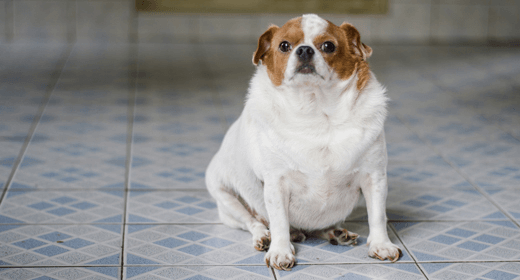

Have you ever wondered why some dogs seem a bit heavier than they should be? Dogs, like humans, can face weight issues, and it's crucial to ensure that they are in their best shape. In today's world of treats and limited exercise, more and more pet parents find themselves asking, 'Why is my dog fat?'. Dealing with dogs and weight loss can be tricky to work along if you don’t know how to go about on this journey of weight loss in dogs. Yet, how should you know if your dog is gaining weight and how to make your dog lose weight?
These days, dogs are grappling with weight issues. And as a dog parent, you must take a closer look at your pet’s body condition. Be curious about questions like, can you feel your dog's ribs easily? Is there a visible waistline? These observations play an essential role in assessing whether your canine companion needs assistance in the weight department. If you find your dog needing help with weight loss, then you must act promptly. Let's explore canine weight management and how to help dog lose weight.
Maintaining a healthy weight for your dog is not just about the appearance; it's about their overall well-being. Dogs with excess weight face health risks, including diabetes and heart diseases. Understanding why your dog is gaining weight would be the first step towards ensuring a longer and healthier life for your furry friend. Overweight and obese dogs often have shorter life spans, emphasising the need to act promptly. This is why it is essential for you to start considering weight loss by providing your pooch with a healthy and hearty lifestyle.
Struggling with dogs and weight loss can be stressful for pet parents. However, fret not. Here is what you need to do to start your dog’s journey towards weight loss:
A balanced diet contains all essential nutrients required for your pooch’s healthy growth. Consulting your vet for a tailored meal plan is suggested when planning your dog’s weight loss journey. It is also important to choose high-quality, low-calorie dog food to maintain a balanced diet. Portion control should be practiced to avoid overfeeding and excessive calorie intake.
One of the key elements to dogs losing weight is regular and consistent exercise. Develop a regular exercise routine tailored to your dog's breed and age. Take your floof for brisk walks, play a game of fetch, or simply plunge into the pool for swimming to keep them active. Gradually increase the intensity and duration of exercise for gradual weight loss. It is also recommended to combine regular exercising with healthier food for best results.
Your pooch’s weight problem can also be linked to numerous medical conditions. It is best to schedule regular vet visits to rule out underlying health issues causing weight gain. Conditions like thyroid problems may contribute to weight gain in dogs. Discuss appropriate medications or supplements with your vet for well-guided canine weight loss.
Consistently monitor your dog's progress and adjust the plan as needed. Gradual weight loss is ideal to prevent health complications. If you notice your fur baby losing or gaining too much weight within a short period, then you should get them checked by a vet. Stick to the plan even after your dog achieves their target weight for overall well-being.
While it's essential to encourage weight loss, it's equally crucial to ensure your dog doesn't lose weight too quickly or in an unhealthy manner.
While shedding that extra weight is essential, you need to make sure your fur baby’s weight loss journey is healthy and effective for a longer period. Given below are a few things you should be mindful of to avoid abnormal weight loss in dogs:
Helping your dog achieve and maintain a healthy weight is essential for their overall well-being. By following the aforementioned steps, consulting your vet, and observing your furry friend closely, you can contribute to a happier life together. Create a healthy weight loss plan, so your dog leads a happy life.
Regular exercising, healthy eating, and treating any underlying illness can lead to adequate weight loss in dogs.
Dog’s ideal weight is determined by its breed, age, and size. If you feel your dog is turning lethargic, low in energy, and overeating then it might be overweight.
Overeating or odd eating habits, lesser energy, little to no exercise, and poor frequent illness are some of the many signs of an unhealthy dog.


In the realm of pet care and canine health, certain nutrients often take centre stage, and one such nutrient is vitamin E for dogs. While it might get as much attention as the other vitamins, the impact of vitamin E on your dog's well-being is significant. From bolstering their immune system to promoting a lustrous coat, this nutrient plays a crucial role in keeping your furry friend in top-notch condition. Join us as we delve into the world of vitamin E for dogs, exploring its multifaceted benefits and uncovering the sources that can contribute to your pup's overall vitality.
Vitamin E, a fat-soluble antioxidant, is a vital player in the health of both humans and our four-legged friends. Grouped into tocopherols and tocotrienols, this nutrient operates as a stalwart defender against free radicals, those troublemakers causing oxidative stress in the body. In simpler terms, it is a guardian of cells. Vitamin E for dogs supports immune function, maintaining skin health, and even contributing to good vision. The catch is that dogs cannot generate vitamin E in their systems, so it is on us, the providers of kibble and treats, to ensure they get their dose.
Absolutely, dogs can and should have vitamin E as part of their dietary intake. Since our furry friends cannot produce this essential nutrient internally, it becomes crucial to incorporate it into their meals. Dog foods often include vitamin E, but if you are preparing homemade meals or noticing a lack in their diet, supplementation may be necessary. This vitamin is not only a defender against oxidative stress but also contributes to the maintenance of healthy skin, a shiny coat, and a robust immune system. While moderation is key in all things, ensuring your canine companion gets an appropriate amount of vitamin E can significantly contribute to their overall health and well-being. Always consult with your veterinarian to determine the right balance for your specific dog's needs.
Without a doubt, vitamin E is exceptionally beneficial for dogs. Its antioxidant properties play a pivotal role in protecting their cells from damage caused by free radicals, contributing to the prevention of various health issues. This nutrient is particularly crucial for bolstering their immune system, promoting skin health, and ensuring a shiny coat. Dogs experiencing deficiencies in vitamin E may exhibit symptoms such as dull coats, muscle weakness, and impaired vision. Incorporating an adequate amount of vitamin E into your dog's diet can be a proactive step in maintaining their overall health and vitality. However, as with any nutritional component, it is important to strike the right balance, and consulting with your veterinarian is advisable to tailor your dog's diet to their specific needs.
Vitamin E is an essential nutrient for dogs. From fortifying cellular defences to enhancing skin and coat brilliance, it offers countless benefits. So, let us understand the crucial role of vitamin E for puppies and dogs in their well-being:
Vitamin E acts as a stalwart defender, neutralising free radicals that can damage cells over time. By doing so, it helps maintain the structural integrity of cells and supports overall cellular health in your dog.
A robust immune system is crucial for your dog's well-being. Vitamin E enhances the production of immune cells, fortifying your dog's defence mechanisms and aiding in the prevention of infections and illnesses.
Vitamin E for a dog’s skin is nothing short of magic, contributing to the maintenance of healthy skin. It helps alleviate dryness and irritation, making it particularly beneficial for dogs prone to skin allergies or dermatological issues.
The link between a shiny coat and good health is well-established. Vitamin E for puppies and dogs plays a huge role in promoting skin health and hydration directly contributes to the vibrant, glossy appearance of your dog's coat.
In the realm of ocular health, vitamin E plays a role in maintaining good vision in dogs. Its antioxidant properties extend to the eyes, helping to protect against age-related degeneration.
Supporting the health of muscles and nerves, vitamin E for dogs benefits your baby’s overall mobility and vitality. This is particularly important for active dogs and those engaged in regular physical activities.
For breeding dogs, vitamin E is essential for reproductive health. It aids in fertility and ensures the healthy development of embryos, supporting a smooth reproductive process in females.
In conditions like arthritis, where inflammation is a concern, vitamin E's anti-inflammatory properties can be beneficial. It may help manage inflammation and alleviate discomfort in dogs with joint issues.
Incorporating vitamin E into your dog's diet offers a holistic approach to their health, addressing various aspects from the cellular level to visible markers like coat condition. As always, consulting with your veterinarian ensures a tailored and effective approach based on your dog's unique needs.
As we curate the perfect blend of flavour and nutrition for our furry companions, let's explore a canine culinary journey featuring vitamin E-rich ingredients. From eggs to safflower oil, each element not only tantalises your dog's taste buds but also delivers the essential goodness of vitamin E, contributing to their overall well-being in delightful bites.
In the nutritional narrative for our canine friends, vitamin E emerges as a hero, weaving a tale of immune resilience, skin radiance, and overall vitality. Its antioxidant prowess safeguards cells, ensuring a robust foundation for your dog's well-being. As you curate their meals, let vitamin E take the centre stage, offering not just nourishment but a key ingredient in the recipe for a thriving, tail-wagging companion.